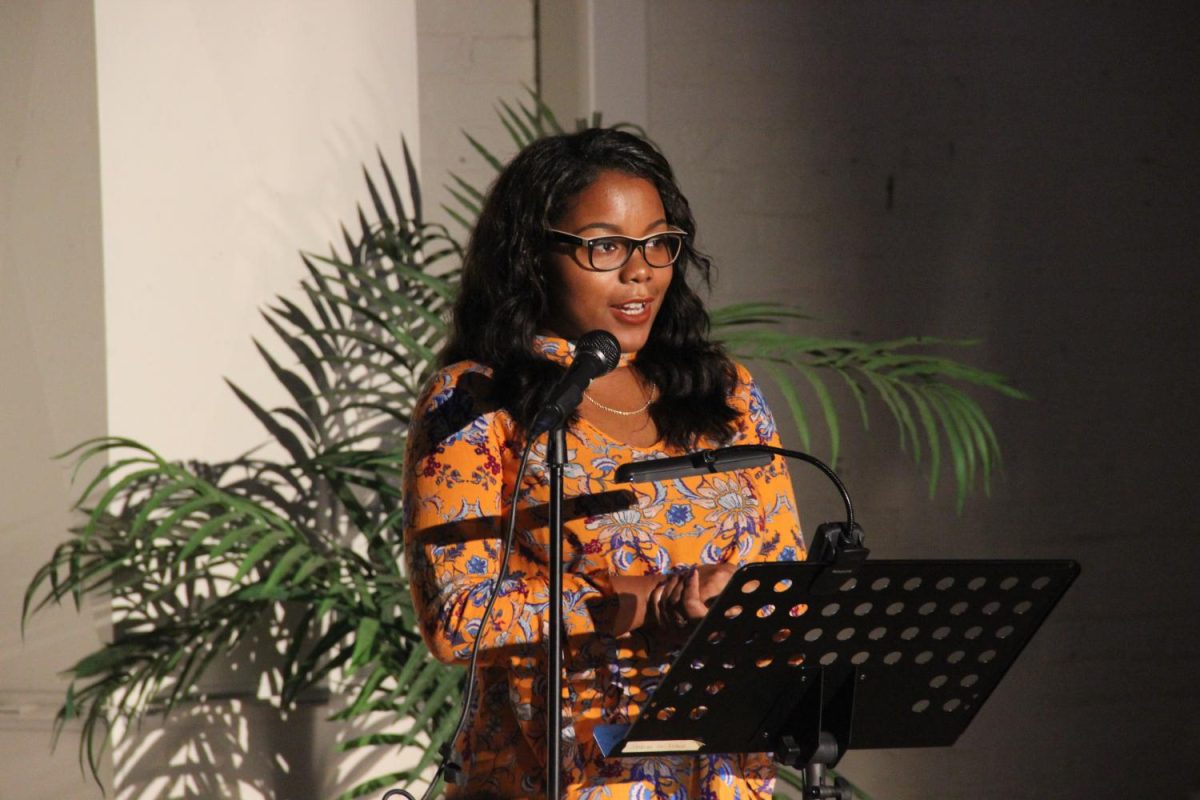‘Stories on stage’ showcases student writings and brings them to life
LeKeia Lee presents her piece “A Brief History of Places I’ve Lived” before it is performed at the Stories on Stage event on Friday, Sept 29.
Stories on Stage is an event where pieces from literary journals from different Los Rios Community Colleges were showcased and performed by professional actors to bring the pieces to life.
The most recent event, coordinated by Sue Staats, took place downtown and showcased a few different pieces, including one from the Cosumnes River Journal written by LeKeia Lee, 24, whose major is undeclared, a student here at CRC. Other pieces included Dylan Wells’ piece from Sacramento City College’s journal Susurrus, Eric Orosco’s piece from American River College’s journal American River Review and Maddy Humphreys’ piece from Folsom Lake College’s journal The Machine.
“It’s a way to sort of reward yourself for the hard and lonely work of writing,” said Staats. “And, the cool thing for writers is to actually hear your piece read because the voice you hear in your head, when you’re writing it, is often very different then how a reader will interpret it.”
Wells and Orosco had their pieces read by Doug Pieper while Lee and Humphreys had their pieces read by Kellie Yvonne Raines.
Lee’s piece, “A Brief History of Places I’ve Lived,” was originally an assignment for her creative writing class.
“We were told to write a list of whatever you like, and I decided to write a list of places I’ve lived and how they’ve affected me and how they’ve helped me become the person that I am today,” Lee said.
Due to the personal aspect of it, Lee said her piece came from a sincere place and her goal was to be open with her audience.
“My inspiration was truth and honesty and being able to share with others the experiences I had,” said Lee. “Often times, it’s hard to share difficult experiences, especially through writing, but I just wanted to be as vulnerable as possible.”
Lee was clear that she mainly wanted her work to be felt by others, no matter what the situation is.
“I just want my work to touch people,” said Lee. “I always say ‘I don’t have to be a New York Times Bestseller. I don’t have to be on the bestseller list at all.’ As long as my work touches someone and they feel connected with me through my work, that’s all I wish to accomplish.”
Lee’s piece was straight from her heart; she never deviated from what her heart told her to write about or how to write it and that’s what she hopes other writers will do as well.
“My advice would be to always stay honest,” said Lee. “Never be afraid of how others will perceive your work. Always live in your truth. The worst thing that can happen is that they won’t choose you, but life goes on. Keep submitting and don’t be afraid to get a rejection because on the other side of rejection are opportunities like this.”
Shani Zuberi, 19, a film major said that she appreciated the opportunity that events like these give to young writers such as herself.
“It was marvelous, it was spectacular,” said Zuberi. “We need to have more of these events and really get these out in the public because creative writing is such an important thing to do, to express yourself with words, and to share it with the community it helps so much.”
English Professor Heather Hutcheson, who is the editor of the Cosumnes River Journal, discussed how the journal’s inclusivity of writers from all over makes it special.
“The CRC journal is unique from all the other campuses because you don’t have to be a student to be published in the journal which means that we are publishing students along with established writers which is a great opportunity for emerging voices,” said Hutcheson.
“Students and writers are getting real life publishing and editing credit that are like other university academic journals where you are not limited to a specific audience of people, the whole world can come into our journal,” Hutcheson said. “This means that students get an actual practical experience to get published in a real world setting and that is more meaningful if you really are going to be a writer.”

